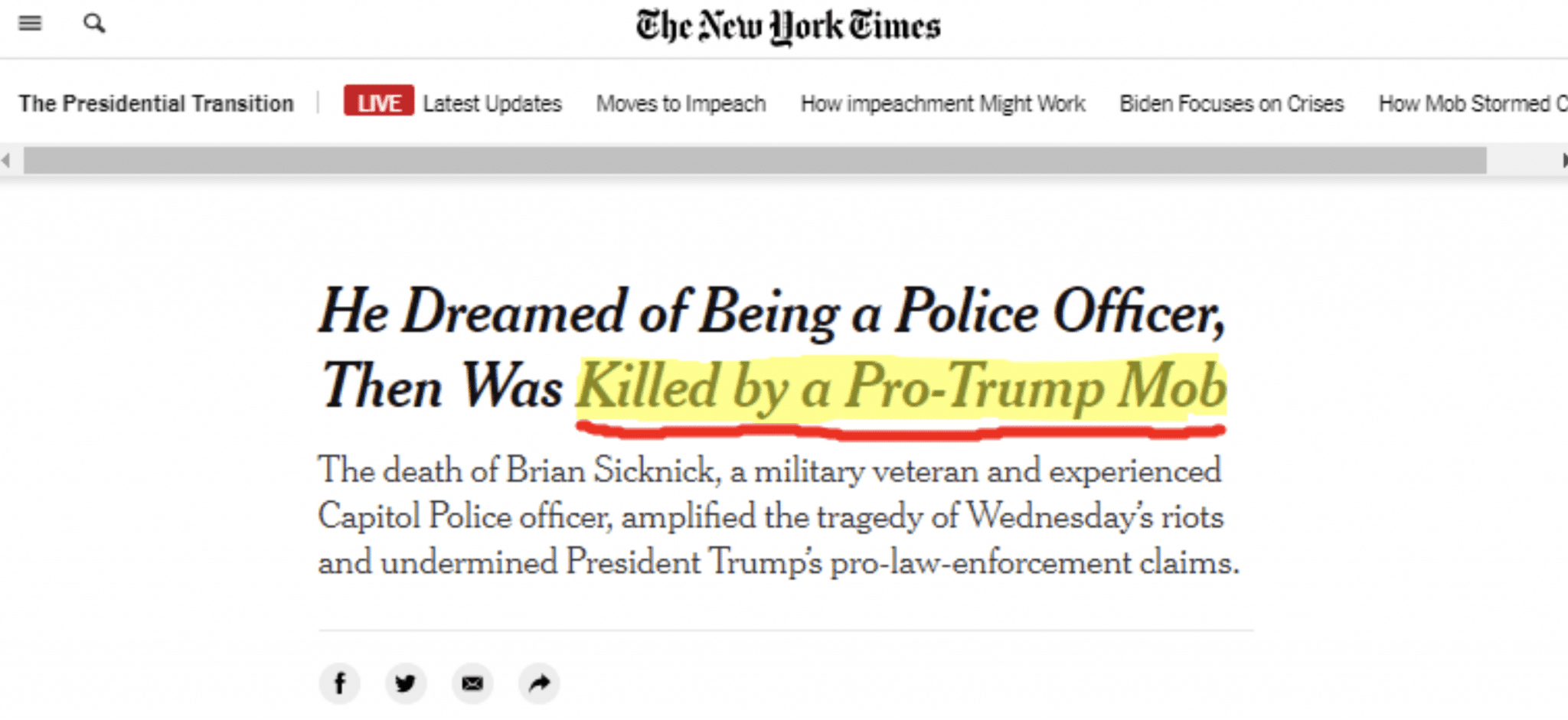
It’s only a single line in the memorandum that House impeachment managers submitted to the U.S. Senate for its trial of President Trump.
But it’s an important one because it is demonstrably false. A hurled fire extinguisher did not kill Capitol Hill police officer Brian Sicknick during the melee at the U.S. Capitol Building on January 6, as the memorandum claims without naming him.
Yet that falsehood, Revolver.com observed yesterday in the first of a two-part story, stands out in the narrative used to impeach former President Trump on false charges of “sedition” and “inciting an insurrection.”
The details about Sicknick’s death are unclear and might remain that way, the website reported.
The Big Lie
The House memo relies heavily on reports from the leftist media and contains just six footnoted references to court affidavits from law enforcement agents. That means the Democrats largely permitted their Mainstream Media Information Ministry to put together the case against Trump.
Part of that case exploits Sicknick’s death.
“The insurrectionists killed a Capitol Police officer by striking him in the head with a fire extinguisher,” the House memo says, citing a story in the New York Times: “A Capitol Police officer dies from injuries sustained during the pro-Trump rampage.”
That story followed this one: “He Dreamed of Being a Police Officer, Then Was Killed by a Pro-Trump Mob.”

The problem, as Revolver reported, pointing to CNN, is that investigators do not believe an “insurrectionist” killed Sicknick with a fire extinguisher.
“Investigators are struggling to build a federal murder case regarding fallen US Capitol Police officer Brian Sicknick, vexed by a lack of evidence that could prove someone caused his death as he defended the Capitol during last month’s insurrection,” the hate-Trump network confessed on February 2, the date on the House memorandum:
Authorities have reviewed video and photographs that show Sicknick engaging with rioters amid the siege but have yet to identify a moment in which he suffered his fatal injuries, law enforcement officials familiar with the matter said.…
To date, little information has been shared publicly about the circumstances of the death of the 13-year veteran of the police force, including any findings from an autopsy that was conducted by DC’s medical examiner.
In a statement the day after the insurrection, Capitol Police said that Sicknick had been “injured while physically engaging with protesters” and collapsed as a result of his injuries sometime after returning to his office. He died the next day in a local hospital.
Still, investigators are clear on one thing:
According to one law enforcement official, medical examiners did not find signs that the officer sustained any blunt force trauma, so investigators believe that early reports that he was fatally struck by a fire extinguisher are not true.
Texted His Brother
Sicknick texted his brother, Ken, a few hours after the riot ended, Revolver reported, citing ProPublica. Ken told ProPublica that “he texted me last night and said, ‘I got pepper-sprayed twice,’ and he was in good shape.”
Continued ProPublica:
But the day after that text exchange, the family got word that Brian Sicknick had a blood clot and had had a stroke; a ventilator was keeping him alive.
“We weren’t expecting it,” his brother said.
As well, Revolver noted, the family received reports that Sicknick was dead before he actually died at 9:30 p.m. January 7.
Sicknick Cremated
Other problems with the line on Sicknick abound, Revolver reported.
Footage from the U.S. Capitol building, “one of the most video surveilled buildings on Planet Earth,” remains a secret, as does the cause of Sicknick’s demise. Where, Revolver rightly asked, is the autopsy report?
Worst thing is, Sicknick’s remains can’t be re-examined:
Unannounced to anyone except incidentally in that Sicknick’s memorial remains turned up in an urn instead of a coffin, Sicknick’s body has been cremated. That means no further forensic analysis can be done to establish the cause or time of Sicknick’s death. Why, one must wonder, would a family still searching for answers, who has no autopsy results, no death certificate, and no medical report, authorize a cremation? Did they?
H/T: Ace of Spades




